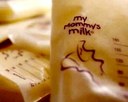Slate.com Covers FFHI Research on the Science of Breast Milk

As part of the "How Babies Work: Emergent Thinking about Emergent Humans" series on slate.com, journalist Nicholas Day quotes former FFHI postdoc and current Harvard Associate Professor Dr. Katie Hinde and FFHI Director Dr. Bruce German about their work on the complexities of human milk sugars. In his blog post, "The Secrets of Breast Milk," Day writes that human milk is both "complicated and evolutionarily amazing."
Using Dr. Hinde's research, Day explores how food choices by a mother effect the quality and composition of her milk production, but also feeds the intestinal microbiome of herself and her baby. Variations in mammalian milk are based on many factors; some of Dr. Hinde research focuses on the effect of the hormone cortisol in the milk of rhesus macaques monkeys. Social relationships and the sex of their children also impact the composition of rhesus macaque milk. Day notes that scientists like Dr. Hinde and Dr. German do not see milk as merely "food," but as a "highly sensitive variable that plays a wide range of developmental roles."
Ultimately, Day's coverage of human milk research concludes with the fact that we know very little about the intricate and complex relationship between infants, mothers, and milk. This makes the science of breast milk even more compelling and exciting for researchers interested in human health.
- Read our coverage of Dr. Hinde's research
- Visit Dr. Hinde's blog "Mammals Suck ... Milk!"
- View Foods for Health Institute publications on the science of breast milk